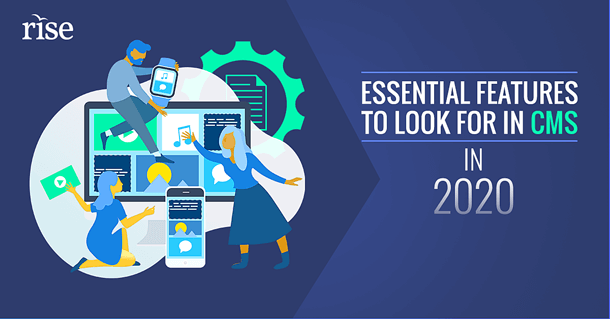

If you’re new in the world of content management systems (CMS), you might be surprised to know that there are hundreds of CMS platforms, each offering unique functionality to meet the diverse business requirements. Whether you wish to create a corporate website or an e-commerce site, a content management system helps you build and maintain website content, design, and functionality without having to touch a bit of code.
In this article, we have highlighted the top 6 standard features of CMS to create and run a website:
1. Intuitive Dashboard & Easy Administrator
The Admin dashboard is the heart of a CMS platform. A user-friendly CMS dashboard enables you to manage the below mentioned tasks effectively when it comes to content administration:
2. Powerful Content Editor
The powerful publishing tool is one of the main features for the modern CMS platform to create and publish different types of content quickly. It helps to integrate business workflows seamlessly. For instance: WYSIWYG (what you see is what you get) editors enable to create and modify page without using HTML coding. Moreover, above content publishing, you should also look for a platform that supports adding images, videos, CTAs, and more.
3. Personalization and Detailed Analytics
Building personalized and relevant experiences for your website users is key to the future of digital marketing. For this, you need a CMS platform that can collect and process user interaction data in real-time. Based on it, you can interpret that information to understand the buying journey of your consumer and then personalize the content experience for the users.
4. Social Media Integration
Social media platforms have become an indispensable medium in eCommerce to reach and interact with your target audiences. So, when selecting CMS for developing eCommerce, don’t miss out on looking for the ability to showcase instant social media sharing buttons on your pages.
5. Security
Advanced security management is a prerequisite for any CMS. Maximizing the safety of the website doesn’t just protect your valuable data, but it also protects your customer’s data and brand reputation.
6. Open APIs
Application Programming Interface (API) is one of the most common terms used among developers and marketers. Now you might be wondering about what makes API such an important feature when it comes to CMS? API allows applications to exchange data by interacting with each other. A CMS with an open API provides business scalability and enables to take advantage of other services. It offers the benefit of seamlessly integrating CMS with other internal and external systems such as ERP, CRM, and more.
So, with this, we hope that we’re able to help you to gain insights into features that will dominate in 2020. The horizon of CMS features continues to evolve with the advancement of the latest technological trends. If you wish to learn how to build websites using content management system, then join an exclusive CMS training course today.
We use cookies to deliver the best browsing experience as well as for analytics and marketing purposes. By continuing to browse this website, you accept the use of cookies. For more information, please visit our Privacy Policy